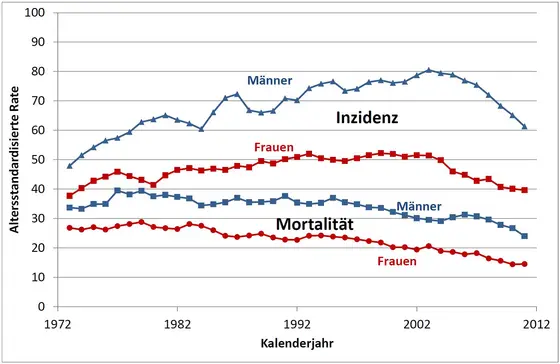Colonoscopy is cancer screening and prevention at the same time, since any precancerous stages that may be detected can be removed during the same examination. In October 2002, screening colonoscopy was introduced as part of the national statutory cancer screening program in Germany for all insured persons aged 55 or older. From 2003 to 2012, about 20-30 percent of those eligible made use of the screening program.
Hermann Brenner and his colleagues at the German Cancer Research Center (DKFZ) in Heidelberg, collaborating with scientists from the Saarland cancer registry and Lübeck University, have now studied whether screening colonoscopy already has positive effects ten years after it was introduced.
Colon cancer develops very slowly over many years in most cases. Therefore, the full effect of the prevention program will manifest itself only in the longer term. However, the age-adjusted rate of new cases in Germany has already declined between 2003 and 2012, by 13.8 percent in men and 14.3 percent in women. The age-adjusted death rate for colorectal cancer dropped by almost 20.8 percent amongst men and by 26.5 percent amongst women.
The strong decline in the number of newly diagnosed colorectal cancer cases manifested itself specifically in the age groups of those aged 55 and older. The rate of new cases had been on the rise over several decades prior to the period under investigation, when this trend reversed. In the age groups under 55 years, for whom the screening examination is not offered, a comparable drop in the number of newly diagnosed cases was not observed.
The patterns now observed indicate that screening colonoscopy substantially contributes to reducing the rates of new cases and death from bowel cancer in Germany. Based on long-term experience in the United States, the scientists expect that this decline in the rate of new cases as well as in the mortality rate will continue and become even stronger in the next few years.
“During a colonoscopy examination, many tumors are discovered at an early stage when the chances of cure are still good," says Michael Hoffmeister, an epidemiologist at the DKFZ. “Therefore, mortality drops even more strongly than the rate of new cases." Hermann Brenner, who is the study head, adds: “Today, there are more than 60,000 new cases of colorectal cancer in Germany each year and more than 25,000 deaths from colorectal cancer. Most of these cases could be prevented by colonoscopy – this is the best argument for making use of this effective prevention program!"
The rate of new cases was calculated on the basis of data from the epidemiological cancer registries; mortality rates were determined based on the official statistics on death causes. Long-term trends were determined based on data from the Saarland cancer registry, which has kept complete records of cancer cases for a long time already.
Hermann Brenner, Petra Schrotz-King, Bernd Holleczek, Alexander Katalinic, Michael Hoffmeister: Rückgang der Darmkrebs-Inzidenz und Mortalität in Deutschland - Analyse zeitlicher Trends in den ersten 10 Jahren nach Einführung der Vorsorge-Koloskopie (Decline in colorectal cancer incidence and mortality in Germany - Analysis of temporal trends in the first 10 years following the introduction of screening colonoscopy; in German)
Deutsches Ärzteblatt, February 19, 2016



